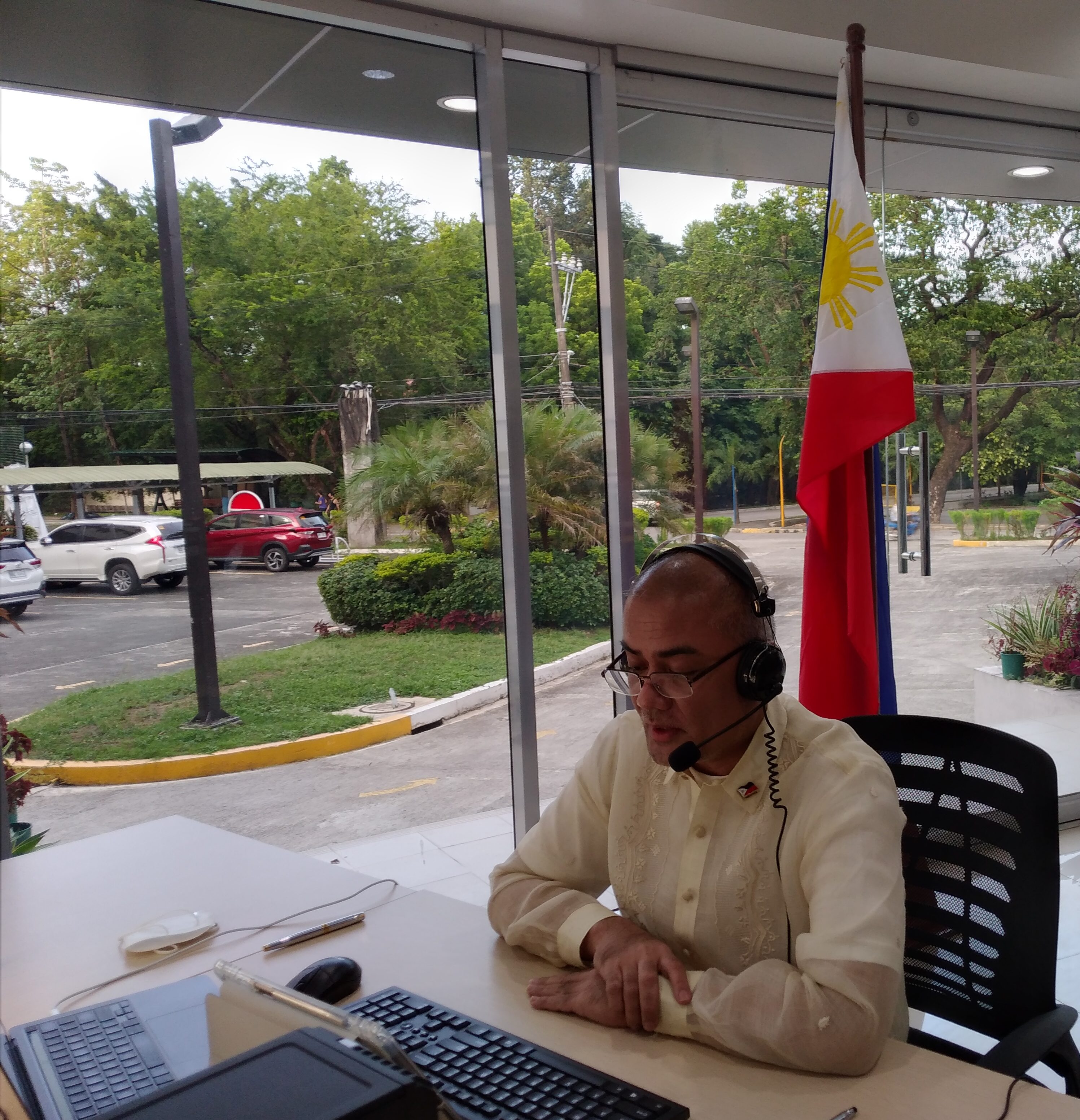Philippine Space Agency (PhilSA) Director General Joel Joseph S. Marciano Jr., Ph.D., delivered the Philippine National Statement under Agenda Item No. 7 on “National Legislation Relevant To The Peaceful Exploration And Use Of Outer Space” on 04 June 2021 during the 60th Session of the Legal Subcommittee (LSC) of the United Nations Committee on the Peaceful Uses of Outer Space (UN COPUOS).
The 60th Session of the LSC was held in hybrid format from 31 May to 11 June 2021.
The Philippines underscored the necessity of “satellite-based connectivity technologies including new and emerging satellite constellations in Non-Geostationary Orbit (NGSO), to provide complementary solutions to the much needed canopy of connectivity, especially for those in remote, geographically isolated and disadvantaged areas.” The Philippines also highlighted the role of the “Internet’s transformative impact on e-government and the delivery of basic services, the elimination of red tape, freedom of information, disaster preparedness, public safety, readiness for climate change, education for all, and inclusive growth.”
Dr. Marciano led the Philippine Delegation in this forum. He was joined and supported by representatives from PhilSA, the Philippine Embassy and Permanent Mission in Vienna, and the Department of Foreign Affairs (DFA).
60TH SESSION OF THE LEGAL SUBCOMMITTEE OF THE UNITED NATIONS COMMITTEE ON THE PEACEFUL USES OF OUTER SPACE
PHILIPPINE NATIONAL STATEMENT
AGENDA ITEM NO. 7 “NATIONAL LEGISLATION RELEVANT TO THE PEACEFUL EXPLORATION AND USE OF OUTER SPACE” | 04 JUNE 2021
delivered by
DR. JOEL JOSEPH S. MARCIANO, JR.
DIRECTOR GENERAL OF THE PHILIPPINE SPACE AGENCY (PhilSA)
Thank you, Madam Chair.
A landmark piece of national legislation, Republic Act 11363 or the Philippine Space Act establishes the Philippine Space Development and Utilization Policy, or the Philippine Space Policy, which focuses on areas of space science & technology applications (SSTA) that address national issues, promote the efficient utilization of space assets and resources, establish capacity-building measures for human resources development, strengthen national defense, and enhance international cooperation. The Philippine Space Act also stipulates Improved Public Access and Resource-Sharing and Industry Development among the powers and functions of the Philippine Space Agency (PhilSA). As such, the PhilSA shall develop, construct, acquire, manage, maintain and operate space research, development and operation facilities and systems on behalf of the Philippine Government for use by various government agencies and other stakeholders; and encourage the commercial exploitation of space capabilities, technology, information, facilities and systems.
Madame Chair and distinguished delegates,
To complement the milestone that is the Philippine Space Act, the Philippine government continues to study and implement national policies for promoting the utilization of space technologies that aim to address long-standing, new and evolving societal needs. In particular, addressing the digital divide remains a priority for the Philippines, and we recognize the challenges entailed by the deployment of terrestrial infrastructure, such as an extensive network of towers, cables, and other related systems, for connecting an archipelago of over 7,000 islands. These challenges have been highlighted even more during this time of global pandemic wherein movement became limited, and Internet connectivity needed to be ubiquitous in order to deliver information and services, to create livelihood opportunities and to sustain productivity. Due to its geographic location, the Philippines is also beset by typhoons, earthquakes, volcanic eruptions and other natural calamities, which additionally necessitates the need for readily deployable, robust and resilient communications infrastructure at times of such emergencies.
In this regard, the Philippines looks to satellite-based connectivity technologies, including new and emerging satellite constellations in Non-Geostationary Orbit (NGSO), to provide complementary solutions to the much needed canopy of connectivity, especially for those in remote, geographically isolated and disadvantaged areas. Thus, the PhilSA is encouraged with the recent issuance of Executive Order 127 or EO 127 entitled, “Expanding the Provision of Internet Services through Inclusive Access to Satellite Services, Amending Executive Order No. 467 (series of 1998) for the purpose”. Signed by the President of the Republic of the Philippines on March 10, 2021, EO 127 liberalizes access to satellite-based Internet services, which is expected to open more widespread opportunities for Internet access nationwide. In particular, enfranchised and duly authorized telecommunication companies as well as duly registered Value-Added Service (VAS) Providers and Internet Service Providers (ISPs) shall be allowed to directly access all satellite systems, whether fixed or mobile, international or domestic, to build and operate broadband facilities to offer Internet service. Through this, the Executive issuance reaffirms the Internet’s “transformative impact on e-government and the delivery of basic services, the elimination of red tape, freedom of information, disaster preparedness, public safety, readiness for climate change, education for all, and inclusive growth”.
Madam Chair and distinguished delegates,
In conclusion, we hope to be able to build upon the momentum of these developments to further encourage the consideration and prioritization of space and its peaceful uses in the policy agenda of the government. This includes filing relevant legislation in Philippine Congress that promotes the advancement of space science, technology, applications and exploration for building and sustaining a robust local space ecosystem that creates value in space and improves people’s lives.
Thank you very much.
— END —




